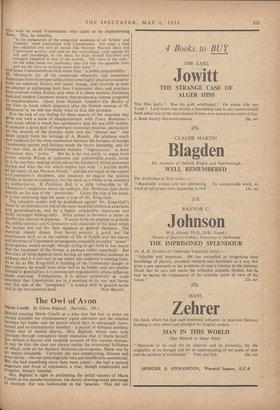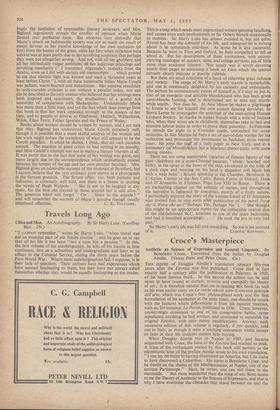The Owl of Avon
Marie Corelli. By Eileen Bigland. (Jarrolds. 18s.) BEFORE treating Marie Corelli as a joke that has lost its point we should consider her contemporary social relevance and the relation between her books and the period which they so adequately repre- sented and so triumphantly satisfied : a period of debased aesthetic values and of mental inertia. Mrs. Bigland, whose own style (Perhaps through contagion) dimly resembles that of Marie herself, has written a factual and readable account of this curious woman. It may be that she does not always realise the occasional brilliance of which; with all her feathery feminine extravagance, Marie was by Ho means incapable. Certainly she was exasperating, fatuous and even idiotic ; she was pathologically vain and insufferably sentimental. But she had something more than mere talent ; she had a natural eagerness and force of expression, a true, though misdirected and Irregular, literary impulse.
Mrs. Bigland is right in attributing the initial success of Marie Corelli to the pseudo-mysticism, the dainty drawing-room patronage of theology that was fashionable in the 'nineties. This did not
Imply the laudation of responsible literary reviewers, and Mrs. Bigland ingeniously reveals the conflict of opinion when Marie floated into profitable • fame. She observes very shrewdly that Marie's attack on fashionable society was not so much the result of moral fervour as her painful knowledge of her own exclusion (at first) from the homes of the great, while her fury when reviewers were unkind was at least partly due to her terrifying suspicion that perhaps they were not altogether wrong. And yet, with all her Snobbery and all her intrinsically vulgar, ,ambition, all her ludicrous prancings and revolting, mendacity (" I translated Algazzalo's remarks from the Arabic, even as I did with certain old manuscripts ... which proved to me that electric light was known and used a thousand years at least before Christ "), with all these lamentable follies Marie Corelli was gallant, warm-hearted and industrious. Her extreme sensibility to unfavourable criticism is not without a parallel today, nor can she be described as the only woman who believed that her writings were both inspired and, sacrosanct, the productions of a genius not unworthy of comparison with Shakespeare. Undoubtedly Marie was more than a little mad, and yet the fact which does emerge from this book is that her work appealed strongly to the readers of her time, and to people so diverse as Gladstone, Matlock, Wilberforce, Wilde, Ellen Terry, Father Ignatius and the Prince of Wales.
Books about women should be written by women, and I am sure that Mrs. Bigland has understood Marie Corelli extremely well, though it is possible that a more skilful analysis of the woman and her work might reduce the complexity of what still appears to be the Corelli paradox. It could be shown, 1 think, that no such paradox existed. The reaction of good critics to bad writing is no novelty, and Miss Corelli's triumph was not in reality a literary triumph at all. It was partly due to the fact that some of her writing was good, and more largely due to the correspondence which undoubtedly existed between the temper of the age and her own.peculiar faculties. Mrs. Bigland gives an admirable account of the fooleries at Stratford, but I cannot believe that the very ordinary punt shown in a photograph is the famous gondola. The Severn affair, too, both pathetic and ludicrous, is extremely well told, and there is a fitness in quoting - the words of Hugh Walpole : " She is not to be laughed at any more, for the love she created in those around her is still alive." The generous mind will forget " Ow ... listen to the ouwels 1 " and will remember the warmth of ,Marie's genuine though usually



































 Previous page
Previous page